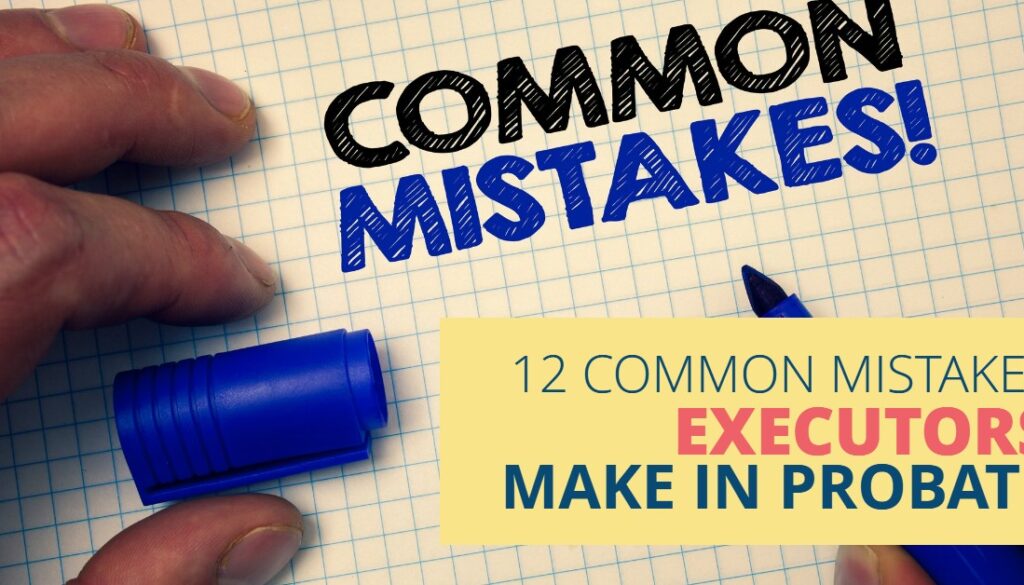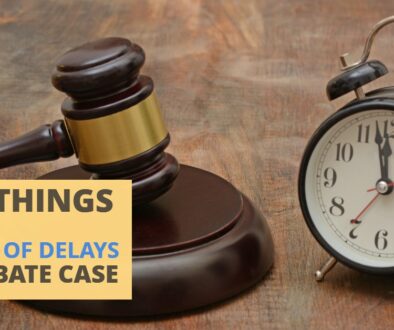12 Common Mistakes Executors Make In Probate

After a loved one passes, the probate court is responsible for ensuring that creditors are paid and any remaining assets are properly distributed to beneficiaries. The estate settlement process helps make this difficult journey easier by providing an orderly system of approval from the court so those left behind can rest assured they will receive what their family member intended them to have.
The probate and estate settlement process can often be a cause of major distress for grieving families—especially if the assets to manage are extensive, complex or involve multiple parties. Navigating through this system in such trying times is never easy; yet it’s an important step towards ensuring you meet all legal requirements needed to settle your loved one’s last wishes.
Avoiding these common mistakes can save you a significant amount of money…
Lacking a specific goal or objective in mind
By starting with the desired result in mind, probate can become a smoother and less daunting experience. Set clear goals for yourself and all involved parties so that everyone is aware of what needs to be achieved – whether it’s achieving peace of mind or paying off debt as soon as possible. This will help ensure you have support throughout the process while acting confidently in your role as executor/administrator.
Not educating yourself on the probate process
Education is paramount when it comes to navigating through the process of estate planning. Knowing your limitations and recognizing situations where professional expertise may be needed can help you make smart decisions for both your short-term and long-term financial stability. Consulting with an attorney about what might best suit your individual circumstances could prove especially beneficial; however, other specialists such as financial planners, CPAs, realtors or even local contractors could also provide valuable insight on potential solutions that would benefit yourself – now and in years to come.
Delaying the initiation of the probate process for too long
While taking time to grieve is essential and understandable, the longer one waits to begin probate after a lost loved one, the more complex things become. Taxes accumulate with interest as creditors’ demands build up in intensity – all while heirs impatiently await their inheritance share. If you find yourself unable to navigate this difficult period alone, reach out for support from those willing to offer it so you can move forward without adding unnecessary stress and pressure onto your already heavy heartache.
Not promptly and appropriately securing and safeguarding the assets of an estate
Estate assets, such as real estate, require swift protection to prevent unauthorized access and potential loss. From paying taxes and mortgages to securing locks on vacant properties or keeping up with curb appeal – managing an estate from afar can be daunting but not impossible. Working collaboratively with a knowledgeable probate-savvy realtor is essential for those who are unable to personally handle the daily affairs of their deceased loved one’s property(s). Additionally, it’s important that all accounts remain secure by having sole control over any related ATMs/debit & credit cards/bank account information.
Neglecting to create a precise list of assets
Accurately inventorying the assets of a deceased’s estate is an essential step in settling their affairs. Whether those who are set to inherit will do so under the terms of a Will or by way of intestate succession, it is imperative that all assets be accounted for and collected into one place. Alongside tangible items such as jewelry or collections, executors should consider whether there may also exist less obvious resources such as certain mineral rights or royalties which must then be addressed accordingly.
Being unaware of available choices for selling real estate
Real Estate is a valuable asset that, with the right plan of action and guidance, can provide an attractive return. Depending on your individual circumstances there are different routes you could pursue when looking to liquidate or acquire real estate: from listing it through traditional means all the way up to finding investors who will pay cash for it in its present condition. Knowing these options provides flexibility so understanding what suits you best puts power back in your hands as far as making smart decisions go.
Advertising real estate after the optimal time has passed
As administrator or executor of the estate, time is crucial. Delay in marketing real estate can pose a challenge to settling quickly and efficiently. To prevent this obstacle, solicit offers as soon as possible with assistance from an experienced probate realtor that has expertise on navigating these processes effectively and promptly!
Prioritizing friendships over hiring the appropriate professionals for a specific task
As your future projects may require a team of experts such as attorneys, realtors, tax advisors or financial planners and estate professionals – you might find yourself surrounded by well-meaning friends who want to help. However it is essential that you know when selecting the most suitable expertise for each individual task: make sure they are experienced in said area and can produce results efficiently; whether this be an attorney friend specialized in business litigation aiding with probate matters or having a realtor companion familiarized with certain locations aiming at listing one’s property correctly. Taking these factors into account will guarantee success from beginning to end!
Failing to maintain precise financial records
Poorly maintained accounts and financial records can cause significant delays when settling an estate, extending the process from a few months to up to two years. As such, it is important for executors of estates to maintain accurate accounting entries by using proper schedules; itemizing receipts/disbursements; correctly indicating carrying & market values, gains/losses on investments etc., or else seek assistance from bookkeepers or CPAs with expertise in this area. Ultimately ensuring all numbers are aligned will avoid objections from heirs and judges during probate proceedings.
Neglecting to retrieve mail from the deceased person’s residence
By taking the necessary steps to forward your mail, you can help ensure that important notices and claims from creditors won’t be missed. Additionally, ensuring not too much mail accumulates will avoid creating an inviting appearance for burglars or vandalism of your property- a smart precautionary measure!
Failing to maintain open communication with beneficiaries
Probate is a complex process with many potential pitfalls, so to ensure successful completion it’s essential that all involved stay apprised of every change and setback along the way. Without open communication between trustees and heirs, previously agreed upon timelines could be derailed; potentially causing immense disruption to those relying on their inheritance by a specific time.
Not properly concluding the estate
At the conclusion of the estate administration, it is common for executors to distribute the assets without formally closing the estate. However, before distributing the assets, there are two options available: obtaining approval from a judge by going to court, or creating a family settlement if all members agree and wish to bypass the probate process. A family settlement provides records of estate administration, including the distribution of assets and expenses, to ensure agreement among family members and prevent the executor from being held responsible for errors. By documenting everything, the executor can limit their liability in case of any unexpected debts. It is crucial to consult an attorney for the preparation of a family settlement, as it is a potent legal tool for protecting the executor’s liability.





